By Laureen Dulo
You may not expect it, but Washington State prisons are full of a variety of gardens. Garden types vary depending on the facility’s climate, partnerships, goals, and programs. Most facilities feature a variety of gardens which may include educational gardens to accompany SPP’s Foundations in Gardening classes, produce gardens for donation or on-site use, herb and medicinal gardens, culture gardens for cultural groups, flower gardens, pollinator friendly gardens, small orchards, rental plot gardens, and drought tolerant native plant gardens. These gardens not only enrich the prison environment but also have positive effects on incarcerated individuals, correctional staff, and visitors.
By cultivating gardens and actively using or donating their produce, incarcerated individuals have the opportunity to gain valuable gardening skills, knowledge about healthy eating, and contribute positively to the local communities. Since 2020, almost 200 students have taken SPP’s 4-credit Foundations in Gardening course. In 2024, prisons reported donating 110,399 lbs. of produce to local food banks and using 131,482 lbs. of produce grown on site within the facilities. However, challenges persist, mainly related to incarcerated individuals having access to the fresh produce grown at facilities.
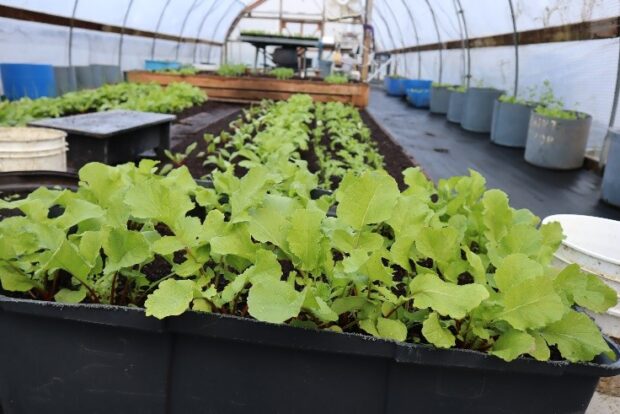
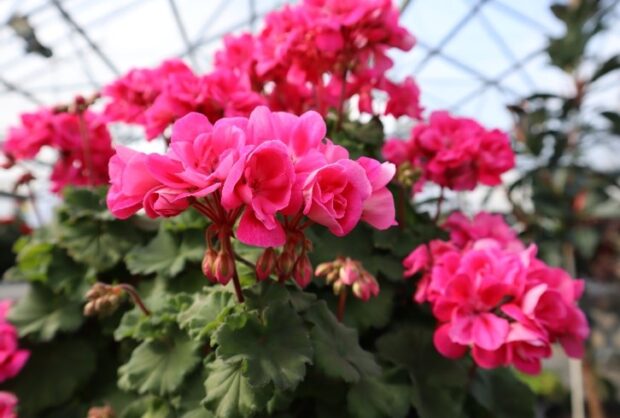
Some plants and flowers from the gardens at Stafford Creek Correctional Center. Photos by Emily Passarelli.
To address these challenges, SPP, with support from former Secretary Strange and other Department of Corrections (DOC) leadership, launched the ‘Garden to Kitchen Project’ (G2K Project) in the Fall of 2021. The goal of this initiative was to create a stronger link between kitchen managers, plant managers, incarcerated gardeners, and various stakeholders to tackle existing barriers and improve access to fresh produce in prisons.
The Garden to Kitchen Project began by collecting information on the challenges and successes associated with utilizing prison-grown produce in facility kitchens. To gain a comprehensive understanding, SPP reached out to plant and kitchen managers across twelve prisons to discuss the limitations and obstacles related to growing, cleaning, and preparing produce. Additionally, the G2K team conducted several in-person listening sessions with incarcerated gardeners to further identify challenges regarding produce access. These gardeners expressed frustration over the waste of facility-grown produce and the lack of formal education on cleaning and preparing it. They also highlighted issues such as staffing shortages, movement closures, small crew sizes, and quarantines. Concerns were raised about the lack of compost and fertilizers, the absence of a formal planting plan, unfair pricing of produce, and the inability to have produce in living unit.
Building on the insights gathered, the Stafford Creek Corrections Center (SCCC) took the lead in piloting the Garden to Kitchen initiative, with support from SPP. To address the challenges identified, SPP provided resources including composting tumblers, seeds, materials for garden beds, books, and garden tools. These contributions were designed to enhance the facility’s capacity to grow and effectively utilize produce, fostering a more sustainable connection between the garden and the kitchen. Through these efforts, the initiative aimed to overcome the previously identified obstacles and improve the overall efficiency and sustainability of produce use within the facility.
To address more barriers, SPP is actively leading sustainability workshops focused on addressing the challenges identified by gardeners, kitchen managers, and plant managers, like delivering dirty produce to the kitchens.
On April 2, 2025, Stafford Creek Correctional Center hosted an inspiring and thought-provoking workshop featuring Kristen McIvor, Director of Harvest Pierce County. Founded in 2010, Harvest Pierce County aims to bridge the gap between food, community, and the environment by engaging residents in creating a just and nutritious food system. With over 15 years of experience in cultivating sustainable food systems in Tacoma, WA, McIvor brought a wealth of knowledge and passion to the conversation, emphasizing the critical role of community engagement in creating a more just and healthy food system. During her presentation, she discussed the importance of building sustainable systems that promote transforming garden produce into healthy meals
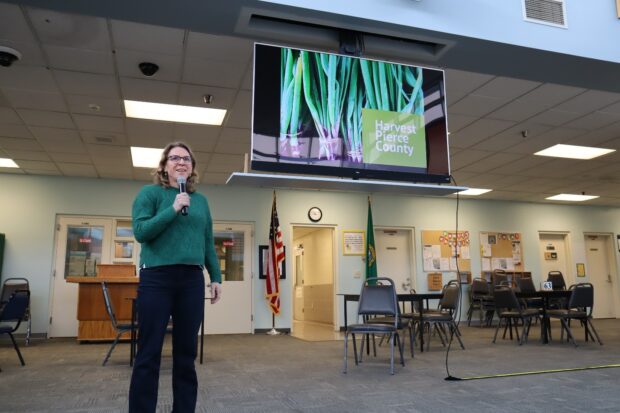
Kristen Mclvor introducing herself to students from Stafford Creek Correctional Center. Photo by Emily Passarelli.
McIvor outlined key programs that were relevant to challenges identified by the facility. Essential practices like basic garden planning, recognizing planting schedules, and understanding food safety were highlighted, with emphasis on understanding your kitchen’s needs, barriers, and limitations
McIvor also shared practical tips that included harvesting techniques specific to various crops, with an emphasis on timing and handling to ensure food safety and quality. Participants were encouraged to engage with the kitchen staff to explore how to prepare their produce, understand any logistical barriers they may face and food safety practices like worker hygiene and proper harvesting methods to mitigate contamination risks.
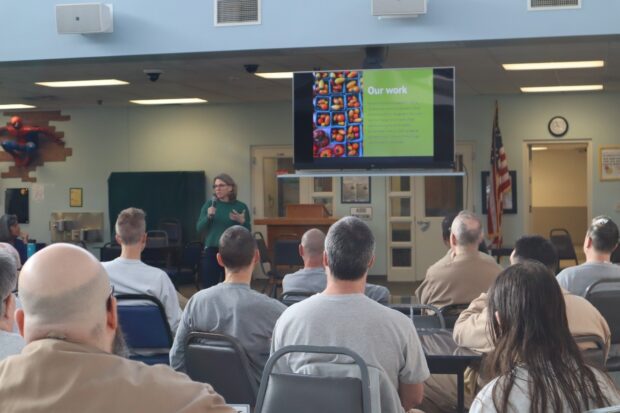
Kristen Mclvor discusses the work they do at Harvest Pierce County with students from Stafford Creek Correctional Center Photo by Emily Passarelli.
The workshop sparked meaningful dialogue about the unique challenges of connecting prison-grown produce to institutional kitchens. Issues such as food safety regulations, kitchen infrastructure, and access barriers remain significant. Yet, with open communication and a commitment to collaborative problem-solving, progress is possible. Programs like those led by Harvest Pierce County, along with the efforts of the Sustainability in Prisons Project, continue to demonstrate how innovation, partnership, and equity can transform systems from within.
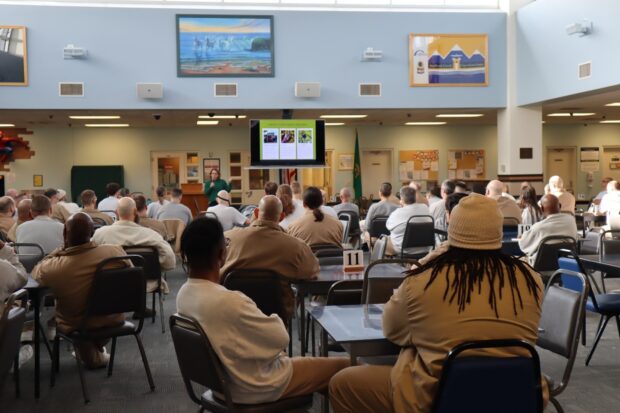
Kristen Mclvor discusses the various programs under Harvest Pierce County with students from Stafford Creek Correctional Center. Photo by Emily Passarelli.
The workshop was a remarkable gathering, attended by incarcerated students, SCCC staff, SPP staff, and Sally Brown, one of SPP’s long-term partners and a UW research professor. As the workshop concluded, students engaged with both Kristen and Sally, asking insightful questions that sparked meaningful discussions. Following this, Kristen and Sally enjoyed a visit to the beautiful gardens at SCCC, witnessing firsthand the incredible progress being made, an inspiring wrap-up to a productive day. To learn more about Kristen and her impactful work at Harvest Pierce County, please visit their website:https://piercecd.org/190/Urban-Agriculture
As we prepare for the next phase of the Gardens to Kitchens Project, we encourage stakeholders, community members, and partner organizations to stay engaged. Together, we can cultivate not only gardens but also thriving ecosystems that support health, dignity, and sustainability both inside and outside of prison walls.
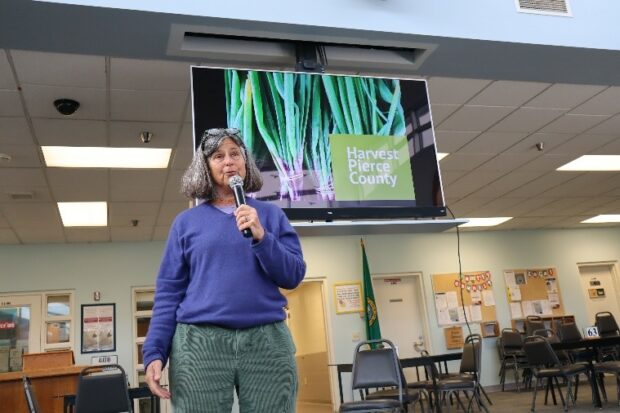
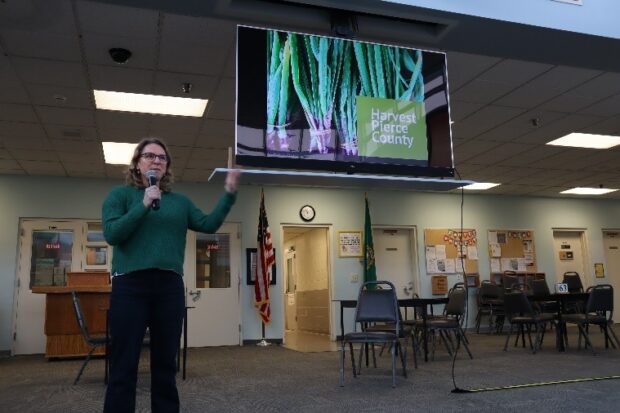
Sally Brown (left) and Kristen Mclvor (right) answering students’ questions at the end of the workshop. Photos by Emily Passarelli.
1 Comment:
Lily
A few weeks ago I was actually looking for a new casino after getting tired of the same old platforms that either lag or complicate withdrawals. I wasn’t planning to switch seriously, just wanted to explore a bit. That’s how I stumbled upon https://krikyacasinobd.org/ . I started slowly — checked the games, tested the interface, tried a small deposit. Surprisingly, everything worked smoothly, and nothing felt rushed or misleading. After a few sessions, I realized I was still using it simply because it felt comfortable and hassle-free. Sometimes that’s really all you need from a platform.